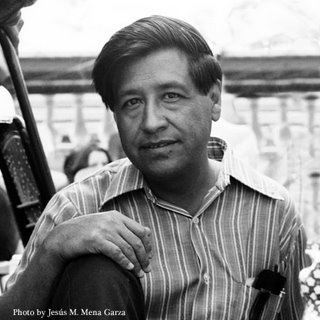Remember Cesar Chavez - March 2006

March 2006 marks the 40th anniversary of Cesar Chavez’s historic 350-mile Peregrinacion or Pilgrimage from Delano to the steps of the state Capitol in Sacramento to draw national attention to the suffering of farm workers.
A true American hero, Cesar was a civil rights, Latino, farm worker, and labor leader; a religious and spiritual figure; a community servant and social entrepreneur; a crusader for nonviolent social change; and an environmentalist and consumer advocate.
A second-generation American, Cesar was born on March 31, 1927, near his family's farm in Yuma, Arizona. At age 10, his family became migrant farm workers after losing their farm in the Great Depression. Throughout his youth and into his adulthood, Cesar migrated across the southwest laboring in the fields and vineyards, where he was exposed to the hardships and injustices of farm worker life.
For more than three decades Cesar led the first successful farm workers union in American history, achieving dignity, respect, fair wages, medical coverage, pension benefits, and humane living conditions, as well as countless other rights and protections for hundreds of thousands of farm workers. Against previously insurmountable odds, he led successful strikes and boycotts that resulted in the first industry-wide labor contracts in the history of American agriculture. His union's efforts brought about the passage of the groundbreaking 1975 California Agricultural Labor Relations Act to protect farm workers. Today, it remains the only law in the nation that protects the farm workers' right to unionize.
The significance and impact of Cesar's life transcends any one cause or struggle. He was a unique and humble leader, in addition to being a great humanitarian and communicator who influenced and inspired millions of Americans to seek social justice and civil rights for the poor and disenfranchised in our society. Cesar forged a diverse and extraordinary national coalition of students, middle class consumers, trade unionists, religious groups, and minorities.
Cesar passed away in his sleep on April 23, 1993, in San Luis, Arizona, only miles from his birthplace of 66 years earlier. More than 50,000 people attended his funeral services in the small town of Delano, California, the same community in which he had planted his seed for social justice only decades before.
Cesar's life cannot be measured in material terms. He never earned more than $6,000 a year. He never owned a house. When Cesar passed, he had no savings to leave to his family.
His motto in life-"sí se puede" (it can be done)-embodies the uncommon and invaluable legacy he left for the world's benefit. Since his death, dozens of communities across the nation have renamed schools, parks, streets, libraries, other public facilities, awards and scholarships in his honor, as well as enacting holidays on his birthday, March 31. In 1994 he was posthumously awarded the Presidential Medal of Freedom, the highest civilian honor in America.


0 Comments:
Post a Comment
<< Home